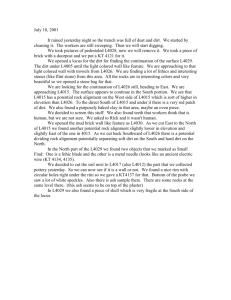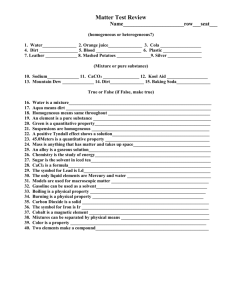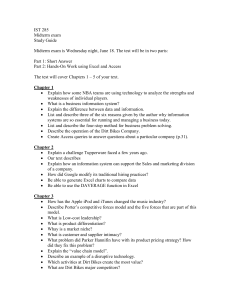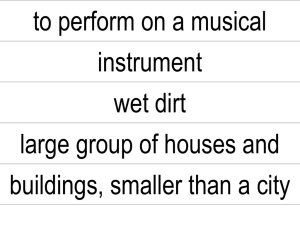healthy bowel motions in kwahu-tafo
advertisement
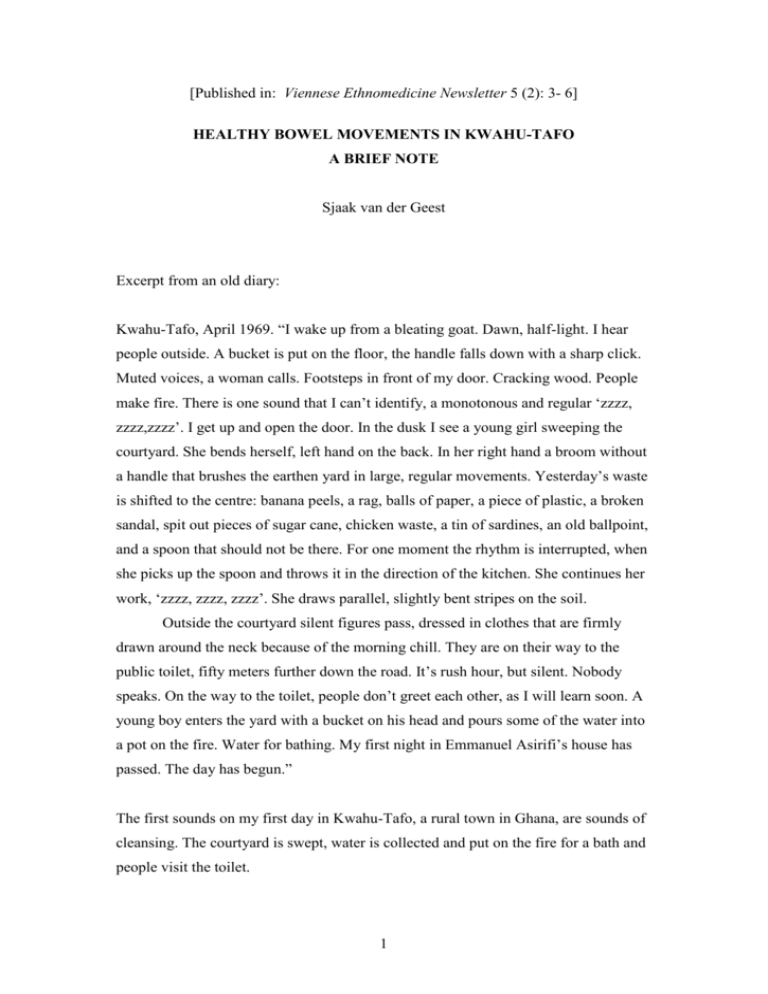
[Published in: Viennese Ethnomedicine Newsletter 5 (2): 3- 6] HEALTHY BOWEL MOVEMENTS IN KWAHU-TAFO A BRIEF NOTE Sjaak van der Geest Excerpt from an old diary: Kwahu-Tafo, April 1969. “I wake up from a bleating goat. Dawn, half-light. I hear people outside. A bucket is put on the floor, the handle falls down with a sharp click. Muted voices, a woman calls. Footsteps in front of my door. Cracking wood. People make fire. There is one sound that I can’t identify, a monotonous and regular ‘zzzz, zzzz,zzzz’. I get up and open the door. In the dusk I see a young girl sweeping the courtyard. She bends herself, left hand on the back. In her right hand a broom without a handle that brushes the earthen yard in large, regular movements. Yesterday’s waste is shifted to the centre: banana peels, a rag, balls of paper, a piece of plastic, a broken sandal, spit out pieces of sugar cane, chicken waste, a tin of sardines, an old ballpoint, and a spoon that should not be there. For one moment the rhythm is interrupted, when she picks up the spoon and throws it in the direction of the kitchen. She continues her work, ‘zzzz, zzzz, zzzz’. She draws parallel, slightly bent stripes on the soil. Outside the courtyard silent figures pass, dressed in clothes that are firmly drawn around the neck because of the morning chill. They are on their way to the public toilet, fifty meters further down the road. It’s rush hour, but silent. Nobody speaks. On the way to the toilet, people don’t greet each other, as I will learn soon. A young boy enters the yard with a bucket on his head and pours some of the water into a pot on the fire. Water for bathing. My first night in Emmanuel Asirifi’s house has passed. The day has begun.” The first sounds on my first day in Kwahu-Tafo, a rural town in Ghana, are sounds of cleansing. The courtyard is swept, water is collected and put on the fire for a bath and people visit the toilet. 1 Dirt and danger Cleansing is the keyword if we want to write about ‘healthy bowel movements in Kwahu-Tafo’. Kwahu-Tafo is the place where I settled for my first anthropological fieldwork many years ago. It is halfway between Accra and Kumasi, on the Kwahu Plateau. The inhabitants, Kwahu people, belong to the about eight million Akan in the country. Cleansing is ‘the point’. Dirt is the great enemy. He who wants to stay healthy should remove dirt, from his yard, his house, his kitchen, his body; from the outside but most of all from the inside of his body. Dirt is a central concept in the Akan culture of Ghana, in its physiology, its pathology, its aesthetics and in its ‘sociology’. Dirt is something unwanted, something one should get rid of. There are several terms which refer to dirt. Efi is dirt which, according to some, comes from outside and attaches to the body, to clothes, to objects, or to a house. It has a temporary character. Efi is not a serious type of dirt, if one removes it in time. It is not dangerous. Atantaneè (lit. nasty or hateful things) is dirt which is more detestable. Most people use this term for dirt coming from inside the body: vomit, phlegm, menstruation blood, urine, or faeces. Human excrement lying somewhere is far more revolting than banana peels or a piece of plastic in the courtyard. Eho yè tan, it is disgusting, dangerous. (Van der Geest 1998). As in most languages, terms of ‘dirt’ assume much wider meanings. They are metaphorically applied to social, moral and aesthetic phenomena. Dirty = ugly = unattractive = nasty = bad = uncivilised = shameful = not respected. Cleanliness (ahoteè), on the other hand, is the pre-eminent metaphor to express positive appreciation. Clean = beautiful = attractive = good = civilised = respectable. Dirt also takes a central place in the explanation of sickness. Almost half of all disease causations collected by Warren (1974:317-18) among another Akan group are related to dirt. People are very concerned about avoiding dirt in order to stay healthy. One should cover food to protect it against flies and other dirt from outside. One should wash one's utensils, sweep away dirt which will attract insects, clean the containers in which water is stored, wash one's clothes regularly, and so on. A pure body, neatly dressed, in a clean house, stands for a healthy person. Warren (1974:320): "Daily bathing is very important...and at least two baths a day are taken, one prior to beginning the day's business and one prior to retiring at night. Babies are bathed more frequently. 2 Clothing is kept very clean and washed and ironed frequently." Adware yè oduro (Taking a bath is in itself a medicine), writes the Ghanaian sociologist Yaw Osei (1978:42). The presence of dirt in the body is seen as the most important cause of sickness. If one does not go to the toilet everyday and one allows faeces to remain in the body for too long, one may get all kinds of diseases. For good health, therefore, a regular visit to the toilet is a sine qua non. A daily bowel movement is ultimate hygiene. There is an analogy between the daily washing of the body, the daily visit to the toilet and the daily sweeping of the yard. That analogy increases in strength if we realise that all three ‘rituals of cleansing’ take place early in the morning. They mark the beginning of a good day. If one starts the day without any of these activities, it is a bad start and one runs the risk of encountering problems. Defecation as prevention There has been a long tradition of ‘testing stools’: since time immemorial, the quality of human faeces has been regarded as a reliable indication of someone’s state of health. Hippocrates writes: It is best when the stools are soft and formed, and passed at the hour customary to the patient when in health; their bulk should be proportionate to the amount of food taken. Such stools indicate a health condition of the lower bowel. But if the stools be fluid, it is best that they should not be accompanied by a noise, nor passed in small quantities at frequent intervals…. It is a bad sign if the stools are very watery, or white, or particularly yellowish or frothy…. Signs more indicative of death are when they are dark, or livid, or oily, or rust-coloured and foul-smelling (Lloyd 1983:175). The mothers of Kwahu-Tafo inspecting their babies’ faeces seem to follow Hippocrates’ instructions. They too study the colour, smell, form and substance and are particularly attentive to the presence of worms. People of all generations have studied their faeces or had experts do so. Thousands of little containers with stools are delivered everyday to hospitals and labs for all kinds of tests. If one knows the tree by 3 its fruits, one knows man by his turd, not only his physical condition, also his mental. “As long as your turd is okay, you are okay”, according to one of my uncles who reached the age of 103. A regular movement of the bowels is not only a sign of good health, it also is a condition for it. That is how the people of Kwahu-Tafo look at it, anyway. They believe that dirt which stays a long time in the bowels starts to ferment and heat as happens in a dunghill. It may affect the blood and spread throughout the body and then try to break out of the body in other ways (cf. Osei 1987). Boils, for example, are seen as the result of dirt, and so are piles, ulcers, excessive phlegm, headaches and skin rashes. A daily visit to the toilet is therefore the first rule of thumb for a healthy life. Someone who has not been to the toilet for one day is ‘constipated’. People start using laxatives as soon as they have `missed' a day. Enemas too are busily used and have become part of popular self-medication. Mothers preparing and applying herbal enemas to their babies were a common sight in the households where I stayed. Osei (1978:43) refers to an “abdominal theory of health and illness”: The ability of the body to resist a disease agent allegedly depends on the proper functioning of the abdominal organs, especially the stomach; for òyareè biara firi yafunu mu (every illness originates from inside the abdomen)…. And he continues: … the Akan desire and care for regular free bowels is virtually a ritual. That is why the enema syringe could be found in every Akan household and rectal suppositories are the commonest medicines known and prescribed even by laymen (Osei 1978:44). “Free the bowels first” is the motto of one of his informants, because with free bowels one does not become sick and does not need any medicine. Regular bowel movement also provides a healthy appetite as one has made room for new food. An elderly man cited the following proverb to express his view on the matter: Wo poma na wo to a, na egye (If you load a gun well, it gives a loud bang). I could not quite figure out the point of this saying, but one of my friends explained that one can load the gun after having shot (the big bang) and load it again. The proverb 4 showed in both a graphic and acoustic way the healthy alternation between eating and defecating. It is not only important to move one’s bowels everyday, it is also advisable to do so early in the morning. When I asked a woman why it should be done in the morning, she replied: “Before you put in new food, it is better to take the old one out.” I was again reminded of the proverb of the gun. One man remarked that one should count oneself among the sick if one had not been to the toilet in the morning (Sè wonkò tiafi anopa a, woka ayarefoò ho). “Shit fears the sun” (Ebin suro owia), another one lectured, “When you are in bed and the sun rises, you want only one thing: going to the toilet.” We have seen that defecation promotes health in the long term as it prevents the piling up of dirt and – as a consequence - the outbreak of illness, but it also produces health and relief with immediate effect. After a visit to the toilet, one feels relieved, freed from a burden, ‘liberated’. In the Dutch language people speak of a “(heavy) delivery”. Lea (1999) compares defecation with other types of ‘discharge’: relieving one’s feelings, getting something off one’s chest, confession. Defecation is ‘catharsis’, cleansing. In the activity of excretion people experience the perfect balance of control and relief, tension and détente. Bowel control can be regarded as a metonym of Crawford’s (1984) cultural definition of ‘health’: an equilibrium of self-control and release, two key values in most cultures. Lea (1999:12) thus summarises Crawford’s ‘vision’: One the one hand, self-control which meant self-denial and control over what one eats, drinks and smokes, was seen as leading to a healthy body, and on the other hand being able to relax and be free from worry, to be able to let go, was also valued as necessary for health. Bringing this down to the level of bowel control and bowel release she continues: In terms of excretion, too, there is a contrast between the pleasurable experience of being able to excrete, when the need arises, which I term having embodied self-control, and the uncomfortable experience of conflict between the mind and the body in which we either try to exert self-control over a rebelling body in order not to excrete at a culturally inappropriate situation or suffer from a body 5 that just won’t let go. Both being able to let go, and being able to hold are valued and welcomed; just as not being able to let go when necessary and not being able to hold on are sources of embarrassment and discomfort (Lea 1999:12). A regular and orderly bowel movement represents rule and order in general, the basic principle of a life that is under control. If dirt, in Mary Douglas’ fortunate term, is ‘disorder’, then irregular and uncontrolled bowel movement is disorder in a double sense. It ducks out of the rules that people themselves have set. Conversely, regulating the movement of bowels defeats the chaos of dirt. The danger rising from dirt is brought under control. Order is both the aim and the starting point of hygiene. Regular bowel movement is the origin and summit of civilisation, while uncleanliness is the acme of dysphoria and loss of status. “Dirt is the evidence of the imperfections of life”, Valerie Curtis (1998:13) cites McLaughlin. Someone who does not control his bowels, is not fully human, still a child. Incontinence constitutes one of the most devastating experiences in a human life. Such a person not only has a disorder, but has become disorder, a synonym for ‘dirt’ as Douglas has pointed out. Culture as prevention If culture can be seen as the way in which people, together, attempt to make life as comfortable as possible for themselves, one also could define culture as one enormously complex system of prevention. Culture is getting rid of dirt, creating and restoring order. Not only religion, as Geertz (1973) argues in his famous essay, is a movement against chaos and disorder. In all areas of culture one finds people sweeping their rooms and yards, washing their dishes and bodies, and putting their houses in order against bugs, dirt, unrest, danger, misfortune, and sickness. Prevention is culture, culture is prevention. Within that total system of preventive thought and action, daily bowel movement takes a central position. The concentration devoted to this daily activity in Kwahu-Tafo is part of a complex system of cleansing rituals which begin before daybreak, when the innocent anthropologist is still fast asleep. 6 Note Acknowledgements. I want to thank my friends who never tired of discussing faecal matters with me: Monica Amoako, Kofi Ron Lange, Patrick Atuobi, Anthony Obeng Boamah, Benjamin Boadi and Yaw Darko Ansah. Correspondence may be addressed to the author: Sjaak van der Geest, Medical Anthropology Unit, University of Amsterdam, Oudezijds Achterburgwal 185, 1012 DK Amsterdam, The Netherlands; e-mail: vandergeest@pscw.uva.nl References Cited Crawford, R. 1984 A cultural account of ‘health’: Control, release, and the social body. In: J.B. Kinley (ed) Issues in the political economy of health care. New York: Tavistock, pp. 60-103. Curtis, V. 1988 The dangers of dirt: Household, hygiene and health. Wageningen: Agricultural University Wageningen, Dissertation. Douglas, M. 1966 Purity and danger. An analysis of concepts of pollution and taboo. Harmondsworth: Penguin. Geertz, C. 1973 Religion as a cultural system. In his: The interpretation of cultures. New York: Basic Books, 87-125. Lea, R. 1999 ‘The shitful body’: Excretion and control. Medische Antropologie 11 (1): 7-18. 7 Lloyd, G.E.R. (ed) 1983 Hippocratic readings. Harmondsworth: Penguin. Osei, Y. 1987 Traditional medicine among the Akan of Ghana. Unpublished Ph.D. thesis. Medical Faculty, Ruprecht Karl University, Heidelberg. Van der Geest, S. 1998 Akan shit: Getting rid of dirt in Ghana. Anthropology Today 14 (3): 8-12. Warren, D.M. 1974 Disease, medicine and religion among the Techiman-Bono of Ghana: A study in cultural change. Ann Arbor: University Microfilms International. 8
